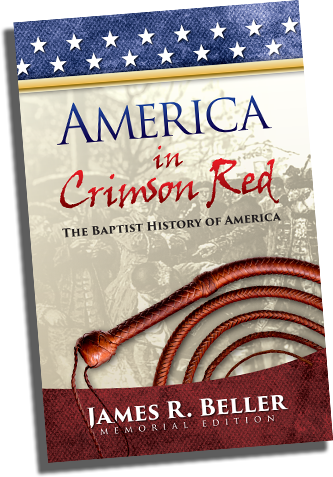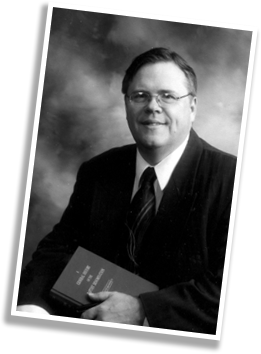The Expiration of Fundamentalism
James Beller
Fundamentalism as a classical movement expired long ago.
The purpose of this writing is to retool your mind. If your identity is cloudy, your direction is also. So let us proceed with sword drawn seeking to regain precious ground as independent Baptists.
For when for the time ye ought to be teachers, ye have need that one teach you again which be the first principles of the oracles of God; and are become such as have need of milk, and not of strong meat. 13 For every one that useth milk is unskilful in the word of righteousness: for he is a babe.
14 But strong meat belongeth to them that are of full age, even those who by reason of use have their senses exercised to discern both good and evil.
6:1 Therefore leaving the principles of the doctrine of Christ, let us go on unto perfection; not laying again the foundation of repentance from dead works, and of faith toward God, 2 Of the doctrine of baptisms, and of laying on of hands, and of resurrection of the dead, and of eternal judgment. Hebrews 5:12-Hebrews 6:2
One of the greatest stories of the American experience was the crucible of Isaac Backus. Most Americans cannot now comprehend the colonial theological battle over baptism. It was real and it carried grave consequences.
Isaac Backus was a Congregational preacher caught in the whirlwind of the Great Awakening of the 1740’s. After hearing a sermon from Eleazer Wheelock, Backus acknowledged his disparate condition before God, turned to Jesus Christ for his only remedy and was born-again by the Spirit of God. Backus thus became one of those derisively called “New Lights,” because he had embraced the Saviour and had a conversion experience.
He now began a search of the scriptures to see if there was any evidence of his former religious state. That is, he wanted to know exactly what he was scripturally when he was a christened member of the Congregational Church, but not yet a Christian. Ah, what John Clarke and Roger Williams insisted when they said, “Christening maketh not Christians,” became large in Backus’s mind. Clarke and Williams suffered for this affirmation as did Obadiah Holmes and many others. Without infant christening the New England colonists were not citizens. There was still a residue of this in Backus’s time.
After a period of much study, Backus simply came to the logical conclusion that infant sprinkling was not found in the Bible. Since the practice of infant sprinkling was not scriptural and had no warrant to be done, it simply expired. That is, it simply was a fiction and did not exist. We see the classic movement of historic Fundamentalism in the same light.
I want to bring three issues to your attention: Fundamentalism as a practice, Fundamentalism as a classic movement, and Independent Baptist Fundamentalism as a culture.
I. FUNDAMENTALISM AS A PRACTICE
We could define fundamentalism as a practice as the active defense of the fundamentals of the faith. All Baptist Christians should agree that we are to earnestly contend for the faith. I think we can see that contending is synonymous with fundamentalism as a practice. Fundamentalism as a practice is what the apostle Paul commands us to do in Jude :3, “…it was needful for me to write unto you, and exhort you that ye should earnestly contend for the faith which was once delivered unto the saints.” So in this sense, we are commanded to fundamentalism, fundamentalism as a practice. If we define fundamentalism as “contending for the faith,” it will always be a part of our walk.
Some may refer to this as “militancy,” as David Cloud writes:
“…to claim that Fundamentalism was NOT characterized by militancy for truth, to claim that fighting and separating have NOT been a significant aspect of historic Fundamentalism, is to fly in the face of history.”
The Five Pointed Creed of Fundamentalism
Concerning a creed, the movement of Fundamentalism militantly defended a number of essentials, usually encapsulated by the declaration of the 1910 General Assembly of the Northern Presbyterian church. They are:
1. Inerrancy of the Scripture (in the original languages)
2. Deity of Christ.
3. Blood Atonement
4. Bodily Resurrection
5. Christ’s Return
As a principled Baptist, I would say there is quite a bit missing from the short list of fundamentals. Principles of repentance and baptism immediately come to mind. While the 5 tenets are certainly good points of doctrine, it is an incomplete set of beliefs.
It is believed that articulation of basic fundamentalist beliefs can be traced to the Niagara Bible Conferences and in 1910, to the General Assembly of the Northern Presbyterian Church. It was there where a declaration was made which became known as the “Five Fundamentals.”
The fundamental creed of 5 tenets is accepted almost universally. George M. Marsden, in “Fundamentalism and American Culture,” (1980) part III says this about the five points of the creed:
“The first formulation of American fundamentalist beliefs can be traced to the Niagara Bible Conference and, in 1910, to the General Assembly of the Presbyterian Church which distilled these into what became known as the ‘five fundamentals’:[7]
The inspiration of the Bible and the inerrancy of Scripture
The virgin birth of Christ.
The belief that Christ’s death was the atonement for sin.
The bodily resurrection of Christ.
The historical reality of Christ’s miracles.”
John Rice stated the five points with slight variation, in his book, “I am a Fundamentalist.”
Curtis Hutson also with little difference acknowledged this five pointed creed in his book “Who is a Fundamentalist.”
David Cloud also states the accepted creed (with a few extras) as:
“…the doctrine of the Trinity; the incarnation, virgin birth, substitutionary atonement, bodily resurrection and glorious ascension, and Second Coming of the Lord Jesus Christ; the new birth through regeneration by the Holy Spirit; the resurrection of the saints to life eternal; the resurrection of the ungodly to final judgment and eternal death; the fellowship of the saints, who are the body of Christ.” (See: http://www.wayoflife.org/database/fivefundamentals.html)
The five point creed of Fundamentalism has long been ingrained in the language of the independent Baptists. We have been socially engineered to accept its incomplete set of five tenets. This has devalued the first principles and caused a disregard for the ordinances of the New Testament local church.
Primary Principles Devalued
Heb. 5:12-6:2
1. Repentance and faith
2. Baptisms
3. Laying on of hands (ordination)
4. Resurrection
5. Eternal Judgment
If you doubt this consider the following four examples:
International Baptist Network
This fellowship was founded in the year 2005. Their web site provided the basis of their unity in their fellowship:
“What will hold together the International Baptist Network is fundamental doctrine. And what doctrine is fundamental to Christianity? First, the Bible is the inerrant, inspired Word of God without error, and is the only authority for Christians and churches. Second, Jesus was born of a virgin and is the God-Man. Third, the sinless Son of God died a substitutionary death for sinners and those who believe in Him can be forgiven of their sins and guaranteed a home in eternity with God. Fourth, the physical resurrection of Jesus Christ from the dead gives new life to all believers. Fifth, the bodily return of Jesus Christ at the end of this age will complete God’s plan and purpose on this earth.”[1]
So, to be clear, the new IBN is a Fundamentalist organization, based on the five tenets of fundamentalism.
John Piper
John Piper, the famed pastor of the Bethlehem Baptist Church of Minneapolis, Minnesota, has gone on record diminishing the primary principles. Several years ago, Piper led his independent Baptist church to adopt a new constitution. Since the church had a large contingency of Reformed persons, it was debated whether to allow believers who had not been properly baptized to become members. Piper addressed his congregation on the matter:
“The most obvious change… is allowing the possibility that a person may become a member who has not been baptized by immersion as a believer but who regards the baptismal ritual he received in infancy not as regenerating, but nevertheless (as with most Presbyterians) in such a way that it would violate his conscience to be baptized as a believer. The elders are proposing that under certain conditions such persons be admitted to full membership. After more than three years of study and prayer and discussion of this issue, the Council of Elders believes that membership requirements at Bethlehem should move toward being roughly the same as the requirements for membership in the universal body of Christ.[2]”
“It is troubling that we require agreement on the doctrine of baptism but not on more important matters like the nature of God’s sovereign grace, the way of salvation by effectual calling, the gift of faith, the nature and power of depravity, the freedom of the will, the work of God in the perseverance of the saints, etc.”[3]
After reading the above points of Calvinism to his congregation, Piper said, “All of those things are more important than agreeing on the time and mode of baptism in my judgment. All of them…the great reformed truths that we love.”[4]
So the tenets of a 16th century Augustinian monk hold more value than the words of God in the mind of John Piper. Congratulations Mr. Piper, you no longer pastor a Baptist church.
Baptist Friends International
When the website Baptist Friends International appeared, it included a statement of faith. The statement of faith was a re-statement of the five fundamentals. I wrote (I am sure I was not the only one) a letter to the site and stated:
“Not trying to be unkind, but, since your statement of faith says nothing about the practice of baptism, are we to assume that Presbyterians and Methodists can be ‘Baptist Friends’ too?”
To my readers, I truly am not trying to be difficult here, but does this not illustrate how we continue to be severed from our roots? I mean the first principles as outlined in Hebrews 5:12—6:2?
And what was the answer to this inquiry of mine? Baptist Friends International simply removed the page that featured their statement of faith.
Clayton Reed’s Church Works Network
Clayton Reed co-authored a book on church polity entitled, Church Works. It was released in 2009 on the heels of extensive research on the part of Reed. Since the release of the book, Reed has launched the Church Works Network, an effort to help Independent Baptists plant churches.
In early 2011, after reading the statement of faith and reading a few of Clay Reed’s posts on his church blog, I emailed him to ask him a very simple but pointed question. We exchanged several communications. Here is what transpired:
ME: Bro. Reed, in contemplating several of your posts on your blog, I have a question: Is baptism by immersion fundamental to Christian faith?
CLAY REED: I believe baptism by immersion is fundament to Baptist faith.
ME: I didn’t ask if baptism by immersion is fundamental to the Baptist faith, I asked: Is baptism by immersion fundamental to Christian faith?
CLAY REED: Have a great ministry, brother.
In looking at Clayton Reed’s writings, he explains his position on ecclesiastical separation based on the five fundamentals, citing the old-time fundamentalists. The primary principles of Hebrews 5:12-6:2 are disregarded. A man who has launched a ministry to direct young independent Baptist preachers in the vital area of church planting is not sure baptism is fundamental to the faith. Again, this diminishes the first principles. I suppose we should not be surprised, knowing the director’s education and his experience in the Fundamentalist movement.
II. FUNDAMENTALISM AS A CLASSIC MOVEMENT
Fundamentalism as a movement is an entirely different matter than Fundamentalism as a practice. Fundamentalism as a movement has a traceable history. Events in the past define the movement.
What may interest independent Baptists of today are the facts surrounding Baptist participation in things like the Evangelical Alliance. What was their typical response?
The Baptists And Various Protestant Union Efforts:
The Christian Union
Prior to the Civil War, an attempt was made by the Pedobaptists to unify non-Roman Catholic denominations in America. This effort was led in the beginning by Henry Ward Beecher, the Boston Congregationalist. Beecher believed that a “great evangelical assimilation” was coming to the United States. [William McGloughlin Jr., Modern Revivalism (Providence: Ronald Press Co., 1959), P. 37.] It was known as the “Christian Union.” The Baptists largely rejected this idea fearing they would violate their principles.
Thomas Armitage, the famed Baptist historian and pastor, attended several Christian Union meetings and was not impressed. None of the leaders of Christian Union were Baptist and had publicly blamed the Baptists for the lack of unity among the denominations. The Presbyterian preacher John Chambers, had said in his pulpit in Philadelphia, “The world cannot be converted until the church is united, and the church cannot be united until the Baptists renounce* ‘close’ communion.”[i]
In the city of New York, in 1866, Dutch Reformed pastor Dr. Vermilye, charged the Baptists with “bigotry and exclusiveness.” His remarks became part of the public record.
It came to pass that Thomas Armitage was asked to speak at the next meeting of the Christian Union Association. This meeting was held at the Twenty-Ninth Street Dutch Reformed Church, the church pastored by Dr. Vermilye. Armitage determined to answer both Dr. Vermilye and the leadership of the Christian Union Association and agreed to speak. There he delivered his message, Christian Union: Real and Unreal.
In his message Armitage said, “As far as I can discover, my Pedobaptist brethren seem to think that [Christian union] consists very largely in a warm-hearted, loving feeling toward each other as regenerated men… disagreement, if you can agree about it, is unity!”[ii]
“There were those that emphasized the good feeling from the Christian Union,” Armitage said, “This good feeling is looked upon, very generally, as good, fair, Bible Christian union. Well, it may be; but if it is, things have changed vastly since apostolic times. The truth is, that kindly feeling is not Christian union, and may exist where ‘the unity of the faith,’ is rent into a thousand shreds.”[iii]
Clearly, Armitage’s problem with the Christian Union was principle. Baptism is a primary principle. See Hebrews 5:12-6:2.
Armitage pointed out that Baptists and Pedobaptists were diametrically opposed on the issue of baptism and therefore were in disagreement about church membership, and even what constituted a church. If the Christian Union called for Baptists to hold communion (the Lord’s Supper) with Pedobaptists then the Baptists and the Pedobaptists would both have to violate their own principles.
Armitage’s stand was the death knell for the Christian Union movement.
The Baptists And Various Protestant Union Efforts:
The Missionary Union Meeting Movement
Though rarely discussed, the Baptists of the South had a controversy about “Union Meetings” on the mission field at the turn of the 20th century. Once again the Baptists were accused of bigotry and unreasonableness. Their position on baptism was called into question. Some of the criticism of the Baptist principled stand on immersion for believers only came from the president of Southern Seminary, William Whitsitt. However, other winds of criticism came from the North.
Two sources of the criticism were Henry Veddar, a Baptist historian who was a prodigy of Whitsitt, and surprisingly, the infamous John D. Rockefeller, Jr. Most people would be shocked to know that Rockefeller claimed to be a Baptist.
It was Rockefeller, with a gift of 20 million dollars who took charge of the University of Chicago, transforming it from a preacher-training institution to a staging area for the march of modernism and globalism. Rockefeller and his dramatist, Veddar purposely undermined the primary principles of the Baptist churches. In the archives of the Southern Baptist Seminary library, Louisville, KY. PCMS 86 4/382, we find this entry:
“…no little alarm was excited in Baptist circles by a pamphlet in the interest of the Union Movement written by John D. Rockefeller, Jr., and widely distributed, urging Baptists no longer to require baptism as a condition of church membership. About the same time, Professor H. C. Vedder of Crozer Seminary published a paper in which it was argued that the Baptist position on baptism was untenable. It was already known that Mr. Rockefeller was using his great wealth to support the Union Movement… After this the Union Movement had little favor among Southern Baptists.” (PCMS – Archive of Southern Baptist Seminary, Louisville, KY. PCMS 86 4/382)
Veddar’s Baptist history book was used by independent Baptist colleges as recently as 2009.
The Baptists And Various Protestant Union Efforts:
The Evangelical Alliance
A few years after the Christian Union movement was rejected by Baptists and at the same time the Union Movement among missions in the SBC was in the experimental stage, another movement gained ground in America. It was known as The Evangelical Alliance.
This organization was formed by various leaders of the Protestant religious societies in an effort to bring the Gospel to the growing urban areas of America.
The Alliance greatly benefited the Congregational evangelists E. P. Hammond and D. L. Moody; and the Methodist evangelist Sam P. Jones. Once again, the Baptists for the most part respectfully declined joining the Alliance. The Evangelical Alliance became a powerful religious entity, but the age of Modernism began and threatened its effectiveness.
From the mid-19th century, colleges of all denominations found themselves in various degrees of doctrinal corruption through Modernism. A battle was begun by men in the various denominations. The movement that sprang from the battle against Modernism was called “Fundamentalism.”
Even though all the movements of the 19th century failed to capture the Baptists, the ecumenical movement of Fundamentalism succeeded.
THE CLASSIC FUNDAMENTALIST MOVEMENT
As we have stated, Fundamentalism as a movement came from the efforts of many preachers and organizations.
The movement can be generally seen as beginning with conservative Presbyterian theologians at Princeton Theological Seminary in the late 19th century. It soon spread to conservatives among the Baptists and other denominations around 1910-1920. Men such as Presbyterians R. A. Torrey, James H. Brookes, and G. Gresham Machen; Methodists such as Bob Jones Sr.; and Baptists such as John Roach Stratton and John R. Rice all defended the Bible. The movement’s purpose was to reaffirm key theological tenets and zealously defend them against the challenges of liberal theology and Modernism.
The term “fundamentalism” has its roots in the Niagara Bible Conferences (1878–1897) which defined those tenets it considered fundamental to Christian belief.
Fundamentalism as a classic movement was promoted greatly by the release of the twelve volume set of books called simply, “The Fundamentals,” which was edited by R. A. Torrey, and published in 1910. Periodicals such as John R. Rice’s, The Sword of the Lord, also contributed to the progress of the Fundamentalist movement.
In my opinion, the Fundamentalist movement fulfilled its purpose to heighten awareness of the attack of modernism on the Bible, and to defend the inerrancy of the scriptures. For this we are grateful.
I was preaching in a Baptist history conference at a well known Baptist college. I gave details on the old Evangelical Alliance of the 19th century. After I had spoken in a morning session, a college professor questioned my thoughts on the Fundamentalist movement, because I taught there was no real reason for independent Baptists to be associated with the Fundamentalist movement any longer. This puzzled the teacher.
I said, “Could you define the Fundamentalist movement as an effort of Bible-believers to rescue the old Evangelical Alliance from unbelief?” He thought about it and answered in the affirmative. So I said, “So then, technically Fundamentalism as a movement no longer exists does it?” He looked even more puzzled. I said, “Are independent Baptists trying to rescue the Evangelical Alliance from unbelief? Are independent Baptists yoked with Methodists and Presbyterians in evangelistic campaigns?”
The answer to these questions is of course, no. The classic Fundamentalist movement of the late 19th and early 20th century has come and gone.
III. INDEPENDENT BAPTIST FUNDAMENTALISM AS A CULTURE
A culture is something that grows from an accident, experience or an experiment. [get definition]
Now what has happened to Fundamentalism as a movement? As it passed out of existence it evolved into primarily an independent Baptist movement. Though the classic, historic, ecumenical movement known as Fundamentalism truly no longer exists, the culture it created is still alive. No one bothered to properly report its evolution as a movement. But the hybrid culture is still there. And we have been socially engineered to accept its culture. This has happened through camp meetings, pastor’s conferences, colleges, and periodicals. Even though evidence shows that independent Baptists do not unite with Presbyterians and Methodists in revival meetings, union campaigns and mission efforts, independent Baptists are still stuck in the identification meme of Fundamentalism.
We need to ask, “Are independent Baptists trying to rescue the Evangelical Alliance from unbelief?” And do we share pulpits with Presbyterians, Methodists and Congregationalists? If the answer is no, and it is, then there is no such things as classic Fundamentalism as a movement. It only exists as an evolved culture. The culture stays alive by independent Baptists promoting every Protestant revivalist and evangelist from the past while denying the heritage of its true ancestors.
The Fundamentalist Movement completed its evolution into an independent Baptist culture around 1976. Some of the evolved culture is good. Its emphasis on aggressively preaching the Gospel to lost souls is good. Its standards of separation are good. But, the independent Baptist culture is good only as it is scriptural. We must admit that some of this culture devolved into some bad Christianity. What do I mean?
Fundamentalism as a movement has given the independent Baptists:
1. A socially engineered mindset that diminishes the ordinances of the New Testament Church.
2. Adherence to a model of super-church that is neither realistic nor practical in reaching the country.
3. Personality driven, business-driven, and empire-building ministry models. These models place undue pressure on ministerial families.
4. Severance of historic testimony.
5. Loss of the simple, pastor-initiated church-planting model.
6. Sin resulting from frustration and comparison.
7. An educational system that promotes and perpetuates Protestantism.
8. Unconfessed and unaccounted for sin on the part of leadership.
The bald naked truth of the matter is that we don’t need Fundamentalism. We ought to be what we are: principled Baptists. Do not surrender your principles! The classic Fundamentalist movement was not scriptural, it does not now exist in its original form, and has no warrant to be continued as a movement. In short, Fundamentalism as a classical movement has expired.
[1] http://www.nljonline.com/ index.php?option=com_content&task=view&id=20&Itemid=2
[2] John Piper, “What the Elders Are Proposing: Amendments to the Constitution and By-Laws” August 31, 2005. http://www.desiringgod.org/library/fresh_words/2005/083105.html
[3] John Piper, Alex Chediak and Tom Steller, “Baptism and Church Membership At Bethlehem Baptist Church, Eight Recommendations for Constitutional Revision,” August 9, 2005. p. 19. http://www.desiringgod.org/library
[4] Ibid., September 14, 2005.
* For example, the Kentucky Baptist historian J. H. Spencer noted that the Salem Association handled a question of order from the 1803 meeting. The question concerned the subject of “communing with other than Baptist societies, which was decided to be out of Gospel order.” Spencer, A History of the Kentucky Baptists vol. 2: 52.
[i] Thomas Armitage, “Christian Union, Real and Unreal,” Doctrinal and Practical Tracts (New York: Thomas Holman, 1884), P. 5.
[ii] Ibid.
[iii] Armitage, “Christian Union,” 4.









